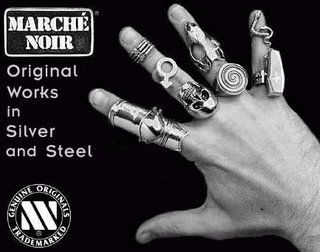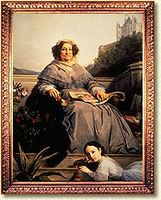Citable No. 25: TTAB Attempts to Clarify Doctrine of Foreign Equivalents in Affirming 2(d) Refusal of "MARCHE NOIR"
In its 25th citable decision of 2006, the Board provided some clarification regarding the doctrine of foreign equivalents in its affirmance of a Section 2(d) refusal to register the mark MARCHE NOIR for jewelry. The PTO had deemed the mark confusingly similar to the registered marks BLACK MARKET MINERALS for "retail jewelry and mineral store services" (MINERALS disclaimed) and BLACK MARKET for women's clothing. The Board affirmed the former refusal but reversed the latter. In re Thomas, Serial No. 78334625 (April 24, 2006).

With regard to the BLACK MARKET MINERALS registration, the Board found Applicant's goods and the Registrant's retail services to be "competitive, inherently related goods and services." Applicant Thomas tried to distinguish its goods by pointing out that its jewelry is of the "Goth" style, whereas Registrant sells components for making jewelry, but the Board once again pointed out that it must look to the goods and services as identified, rather than to the actual usage of the marks. There are no such limitations on use in the application or the cited registration.
Turning to the marks, the Board noted that MARCH NOIR is a French term that Applicant translated into English as "Black Market." The doctrine of foreign equivalents requires that "foreign words from common languages" be translated into English in order to determine the similarity in connotation to English words. "The doctrine is applied when it is likely that 'the ordinary American purchaser would 'stop and translate [the term] into its English equivalent.'" See Palm Bay Imports, Inc. v. Veuve Clicquot Ponsardin Maison Fondee En 1772, 73 USPQ2d 1689 (Fed. Cir. 2005).
Applicant Thomas argued that, according to the 1990 census, only 0.6% of the population speaks French "well" or "very well," and therefore it is "unlikely that the 'average American buyer' will translate the mark MARCHE NOIR as required by Palm Bay because the evidence shows that the average American buyer does not speak French." The Board disagreed.
"The 'ordinary American purchaser' in this context refers to the ordinary American purchaser who is knowledgeable in the foreign language. See Trademarks and Unfair Competition, supra at 23:26 (4th ed.) ('The test is whether, to those American buyers familiar with the foreign language, the word would denote its English equivalent.") *** We recognize that the doctrine is not an absolute rule, but applicant's interpretation would write the doctrine out of existence."
Relying on dictionary translations and Applicant's own translation, the Board found that MARCHE NOIR "is the exact French equivalent of the English idiom BLACK MARKET." "[W]ithout question, that is how it would be recognized and understood by the French-speaking public." Furthermore, unlike CORDON BLEU, which has been "adopted into the English language," here "the mark would be translated by those who are familiar with the French language."
"when we consider the similarity in connotation of the marks, together with the relative strength of the mark, the close relationship of the goods and services and the inexpensive nature of their purchase, these factors combine to outweigh the dissimilarities in the marks."
Applicant's ownership of a now-cancelled registration for MARCH NOIR for jewelry was of no help, nor was his assertion of a lack of actual confusion. As to the registration, the Board is not bound by previous decisions of Examining Attorneys. As to actual confusion, Applicant provided no evidence of the extent of use of the two marks, and so his assertion of long, contemporaneous use "is of little probative value."
As to the BLACK MARKET registration for women's clothing, the Examining Attorney relied on several third-party registrations in contending that jewelry and clothing are "highly related goods." The Board was not buying. "We cannot conclude on the basis of the evidence of record that jewelry and clothing are so closely related that, notwithstanding the differences in the marks, purchasers would naturally expect these goods to emanate from the same source." The Board therefore could not find a likelihood of confusion between these marks.

TTABlog comment: Last year in Palm Bay, the CAFC said that the doctrine of equivalents should be applied "only when it is likely that the ordinary American purchaser would 'stop and translate [the word] into its English equivalent.'" (citing In re Pan Texas Hotel Corp., 190 USPQ 109, 110 (TTAB 1976)). The court agreed with the TTAB that "it is improbable that the average American purchaser would stop and translate "VEUVE" into "widow." The Board had found that "an appreciable number of purchasers are unlikely to be aware that VEUVE means 'widow' and are unlikely to translate the marks into English."
Is the Board's ruling here at odds with Palm Bay when it says that the "ordinary American purchaser" means someone knowledgeable in French? The CAFC and the TTAB seemed to say that the average American purchaser would be unlikely to translate VEUVE into "widow" because he or she is unlikely to be aware of the French word. In other words, the average American purchaser does not know French.
There's something askew here, and the Board's failure to acknowledge this discrepancy is troublesome. Will the CAFC have to straighten this out?
Text Copyright 2006 John L. Welch




0 Comments:
Post a Comment
<< Home